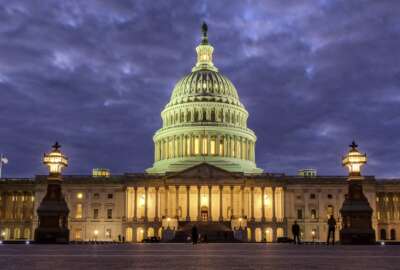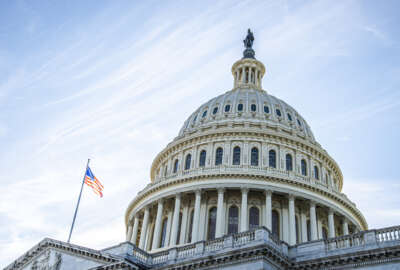USPS says overhauling health benefits key to postal reform
The cash-strapped U.S. Postal Service says it can return to being profitable and begin to pay down its debt if Congress gives it the authority to overhaul its...
The cash-strapped U.S. Postal Service says it can return to being profitable and begin to pay down its debt if Congress gives it the authority to overhaul its health benefits structure.
“We want to negotiate better and more cost-efficient health care coverage for our employees and retirees and ensure better integration with Medicare,” Postmaster General Pat Donahoe testified at a Senate Homeland Security and Governmental Affairs Committee hearing Thursday. The committee is crafting legislation to put the Postal Service back on firmer financial ground.
Donahoe said the committee’s draft bill doesn’t go far enough in granting the Postal Service greater control over its health care costs. The Postal Service has proposed launching its own postal-specific health care plan — either within the broader Federal Employees Health Benefit Program or by negotiating directly with insurers.
“Today, the Postal Service and its employees are paying for benefits we do not use,” Donahoe said. Postal employees pay into Medicare taxes but many of the agency’s retirees never draw on Medicare benefits because it doesn’t integrate well with FEHBP plans, he said. “We are, effectively, buying insurance we do not need and we’re overpaying for it,” he added.
Instead of paying “full freight” into the FEHBP, postal retirees could instead rely on Medicare as their base coverage, since they’re already paying into the system, he said.
“Under this vastly preferable scenario, the Postal Service and our retirees would merely need to fund far less costly benefits wrapped around Medicare coverage,” Donahoe testified.
Currently, 77 percent of Postal retirees draw on some form of Medicare for their health coverage, according to the Government Accountability Office.
But moving the remaining 23 percent out of FEHBP entirely and into a separate plan integrated with Medicare would help reduce the amount USPS spends on health care from 20 cents of every revenue dollar to 8 cents — or about $8 billion annually through 2016, compared to current expenses, Donahoe said.
Doing that would “virtually eliminate” the agency’s current unfunded liability for retiree heath care benefits and allow the agency to reduce to a more manageable level the amount it must set aside to fund future liabilities.
Currently, the agency is required to make fixed, massive payments — clocking in at $5.5 billion annually — to prefund future retirees health costs. USPS defaulted on those payments twice last year and is days away from doing so again.
OPM concerned about USPS exit
However, the Office of Personnel Management is concerned about how the Postal Service’s planned exit would affect the FEHBP, which OPM manages.
Jonathan Foley, OPM’s director of planning and policy analysis, said the overall impact would be about a 2 percent increase in costs per enrollee. But he testified Postal Service’s withdrawal from the federal health system would have a larger impact on those plans with a heavy presence of postal employees.
There are currently 23 health plans in which postal employees and retirees make up 50 percent or more of the enrollees, he said.
“If these plans were to choose to withdraw from the FEHB program, their remaining members would need to choose another health insurer,” Foley said. “This might also reduce choices among plans, which reduces competition.”
Frank Todisco, the Government Accountability Office’s chief actuary, said even though postal employees and retirees make up 25 percent of the total population of those enrolled in the FEHBP, the remaining enrollees wouldn’t be “significantly affected” by the agency’s exit from the system.
Still, Foley said USPS employees are already well-served by the FEHBP. OPM has decades of experience experience running the program; administrative overhead accounts for only 0.08 percent of health premium costs, and the agency has worked to keep annual average premium increases below 4 percent for each of the last three years, he said.
“How confident are we that we can strike a better deal?” Sen. Kelly Ayotte (R-N.H.) asked Donahoe.
“I think that we can,” Donahoe said. “We have a million people, retirees and current. We would be the largest single insured organization in this United States. We think that between either one provider or a set of providers, we would have the ability to force competition.”
However, Donahoe said USPS is also open to “carving out” a health benefits plan from within the FEHBP. Currently, 16 plans account for 95 percent of all USPS employees’ health coverage.
USPS plan would increase Medicare costs
Senators also raised questions about the impact of the Postal Service plan on Medicare, which is itself, facing financial challenges.
By design, Donahoe’s plan would increase employees’ reliance on Medicare. In fact, of the $55 billion in reduced health benefits liability that would be realized from his plan, nearly $49 billion is related to greater integration with Medicare, according to GAO.
The Postal Service’s plan would increase the average annual cost to Medicare by about $1.3 billion annually, according to John Dicken, GAO’s director of health care issuess.
“That’s a fairly small share of overall Medicare spending, which is over $550 billion a year, but certainly needs to be weighed given that both programs are facing long-term fiscal sustainability issues,” Dicken said.
Thursday marked the Senate’s second hearing on postal reform in as many weeks.
“There is no single easy solution to this problem,” said Sen. Tom Carper (D-Del.), the committee chairman and the co-author, along with the committee’s ranking member Tom Coburn (R-Okla.) of the Senate’s draft reform bill. “It’s been a problem years in the making and will take years to fully address. But with urgent action from Congress, the collapse of the Postal Service is avoidable.”
The House Oversight and Government Reform Committee approved its version of postal reform earlier this summer.
RELATED STORIES:
Postmaster says Senate bill a good start to postal overhaul
Pension, health care changes key to Senate postal reform plan
House committee moves forward on postal reform
Copyright © 2024 Federal News Network. All rights reserved. This website is not intended for users located within the European Economic Area.





